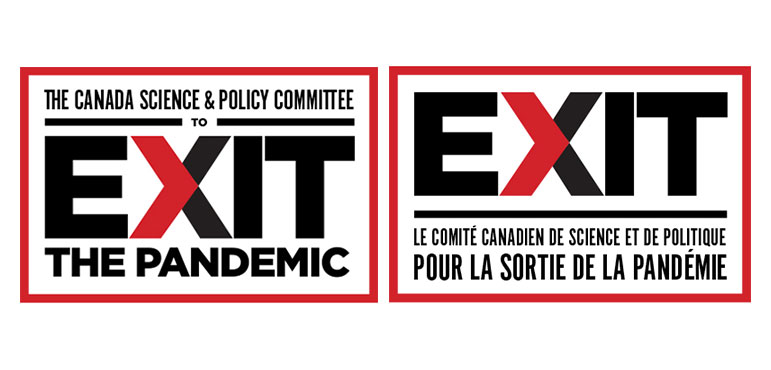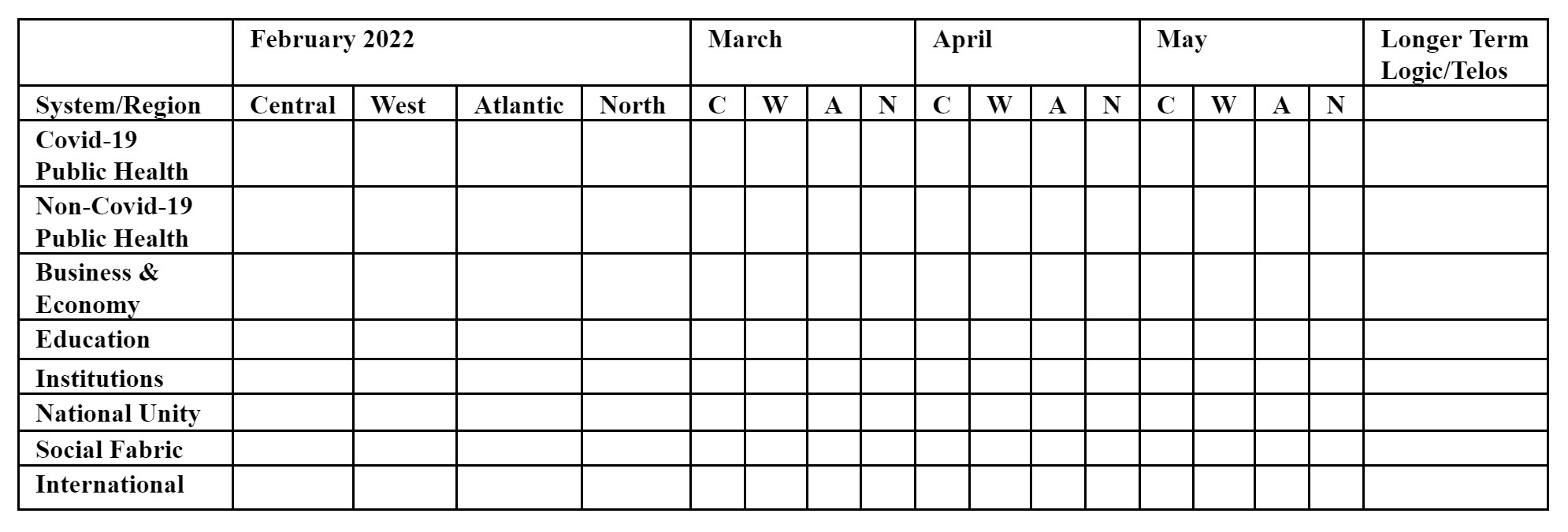 The Canada Science & Policy Committee to Exit the Pandemic was created in January of this year, bringing together the country’s leading scientists, doctors and policy professionals across the disciplines – from all regions of Canada – to advise on the content and choreography of a national exit plan from the pandemic for Canada.
The Canada Science & Policy Committee to Exit the Pandemic was created in January of this year, bringing together the country’s leading scientists, doctors and policy professionals across the disciplines – from all regions of Canada – to advise on the content and choreography of a national exit plan from the pandemic for Canada.
View and study the National Exit Table in full detail (XLS)
Voir la version française de la Table national de sortie (XLS)
The Exit Committee has now met numerous times and consulted extensively across the country and internationally. Today, it:
- declares that Canada’s pandemic is effectively over – that is, it has reached endemic stage in Canada, and should be treated as such; and
- issues a National Exit Plan from the Pandemic covering all parts of Canada over the next several months, across the 8 (eight) national systems in crisis:
- Covid-19 public health
- Non-Covid public health
- Business & the economy
- Education
- Institutions
- National unity
- Social fabric
- International
Canada’s Pandemic Ends
Canada’s pandemic is now effectively over, and the Covid-19 virus is to be considered endemic. This is consistent with the considered positions, today, of, among others, Singapore, the United Kingdom, Ireland, Spain, Netherlands, Denmark, Sweden and Norway. It means three things:
- 1. Covid-19 is now highly manageable for Canada’s health and other systems, and thus to be managed on an ongoing basis, with seasonal ramp-up and interventions, consistent with other coronaviruses circulating in Canada
- 2. Covid-19 interventions can now be far more targeted, flexible and creative for aged and co-morbid segments of the population (early treatment, seasonal anticipatory vaccination, antivirals, therapeutics, masking, etc.)
- 3. Covid-19 is increasingly a minor systems issue among other growing 8 (eight) systems issues in Canadian state and society (non-Covid public health, education, the social fabric, the economy, national unity, etc.)
The National Exit Plan
The Exit Committee’s National Exit Plan is described in a comprehensive “National Exit Table” (matrix) mapping the “exit from crisis” for each crisis system by Canadian region (All-of-Canada, Centre, West, Atlantic, North) by month (February, March, April and May 2022). Interactions among systems are taken into account in the choreography of exit, all captured in an 8 x 21 matrix. Here is a simple representation of that matrix – far more complex than a “tweet”.

View and study the National Exit Table in full detail (XLS)
Voir la version française de la Table national de sortie (XLS)
The Committee plans to add and refine detail for each system, for each region, as the months pass, reflecting the scale and complexity of the country. These evolving details will be briefed out regularly. A working emphasis of the work of the Exit Committee is that the exit of Canada’s kids and youth is particularly important, at high energy, in leading the country out of several systems crises, and showing us how again to live elegantly.
Highlights of the Exit Table include:
- Immediately – February 2022:
- Across Canada, explicit removal of all vaccine mandates, passports and conditionality (governmental, business, schools, sports and any other organizations), mask orders (including in schools), capacity limits, testing, quarantining and other Covid restrictions (with the aged and those with co-morbidities being addressed with early interventions, seasonal vaccination and other treatments)
- All physicians, civil services (federal, provincial/territorial and municipal) to return to full-time in-person work
- Schools: All masks, cohorting, distancing and other restrictions removed. 100% return to in-person schooling (no hybrid, no full-time online learning). Return of full-on sports, music and gatherings. Ontario to add Grade 13 for learning catchup. Intense learning catchup and consolidation in all provinces.
- Universities: Removal of all vaccine restrictions on student admission/enrollment and participation in varsity sports and other related activities. Return to full-time in-person learning. Removal of all masking and distancing requirements in class and on campus. Full return of all social activities.
- National door-to-door campaign to find and reintegrate into education the 200,000 Canadian children who have been ousted from all forms of schooling during the pandemic
- LTCs: Establishment and preservation of mandatory staff/patient ratios and surge capacity, but with commitment never to isolate elderly patients
- Explicit public commitments from all provincial and territorial governments not to reverse course on business shutdowns (we are not turning back) – key for business confidence – and also to never again close schools
- Removal of any and all Covid-19-related restrictions on Canadian travel by air, train, road or water between all provinces/territories
- Stand up National Intergovernmental Committee to fully remove, within two months, all pandemic-period borders and barriers between/among provinces and territories
- March 2022:
- Full reopening of Canadian borders to maximum international travel (in and out) and visitors without restrictions
- Beefing up of compulsory schooling and duty to educate statutory language and standards
- Large-scale loans (and loan guarantees) and grants for business start-up and recovery for most in-need sectors (restaurant, hospitality, tourism, retail, recreation, culture), including targeted Indigenous business start-ups
- Maximum ramp-up of capacity and staffing across provincial and territorial health systems to clear up backlog of surgeries, procedures and diagnoses, including direct outreach to population
- Expansion of general ICU beds and (surge) capacity to best-in-class in the G20
- Statutory recentralization of public health powers (e.g. removal of s. 22 of the Ontario Health Promotion and Protection Act)
- Incentivization of intense travel across the country by all Canadians, starting with the youth
- April 2022:
- Sunday, April 3rd: National Walk for Canada’s Youth – all of Canada’s children/youth, students (JK-12 & university/college), athletes, teams, sports clubs, musicians, writers and poets walk together to celebrate Canadian childhoods and youth (our future!)
- Start of intense spring and summer for Canada’s children – sports, tournaments, festivals, play and travel
- Launch national and provincial programs and grants to encourage and drive intense travel of and across Canada by all Canadians in spring and summer
- Royal Commission on the Pandemic – Emergency Response and Preparedness (National Surge Capacity), Health Care System, Institutions
Members of the Canada Science & Policy Committee to Exit the Pandemic:
Irvin Studin, PhD (co-chair) – President, The Institute for 21st Century Questions; Chair, Worldwide Commission to Educate All Kids (Post-Pandemic); Editor-in-Chief & Publisher, Global Brief Magazine (Richmond Hill, Ontario)
Dr. Kwadwo Kyeremanteng, MD (co-chair) – Critical Care & Palliative Care Physician, The Ottawa Hospital & Montfort Hospital; Associate Professor of Medicine, University of Ottawa (Ottawa, Ontario)
Dr. Martha Fulford, MD – Associate Professor of Medicine, Michael G. De Groote School of Medicine, McMaster University (Hamilton, Ontario)
Dr. Olga Kovalchuk, MD – Professor & Board of Governors Chair in Cancer and Canadian Institute of Health Research Chair in Gender and Health, University of Lethbridge (Lethbridge, Alberta)
Thomas Michalak, MD – Professor of Molecular Virology and Medicine (Hepatology)
Canada Research Chair (Tier 1) in Molecular Virology, Molecular Virology and Hepatology Research Group, Faculty of Medicine, Memorial University (St. John’s, Newfoundland)
Dr. Paul Perlon, MD – Head of Emergency Physician Group, Mackenzie Health Hospital (Richmond Hill, Ontario)
Edward Mirasty – Head of Education, Prince Albert Grand Council (Prince Albert, Saskatchewan)
Pierre Pettigrew – Former Minister of Health of Canada (Montréal, Québec)
Mike Aumond – Former Secretary to the Cabinet, Government of the Northwest Territories (Yellowknife, NWT)
Michael Shouldice – Past President, Arctic College (Rankin Inlet, Nunavut)
Fred Lazar – Professor of Economics, Schulich School of Business, York University (Toronto, Ontario)
Benjamin Ryan – Chief Commercial Officer, Air North (Whitehorse, Yukon)
Rosemarie Kuptana – Arctic Rose Foundation (Halifax, Nova Scotia)
Michael Barutciski – Professor of Political Science, Glendon College, York University (based in Montréal, Québec)
Alexandra Lysova – Associate Professor of Criminology, Simon Fraser University (Vancouver, British Columbia)
Objectives of the National Exit Committee:
- 1. To bring together Canada’s medical-scientific and policy communities – otherwise acting in solitudes – to exit the pandemic with speed
- 2. To change the psychology of the national discussion of the Covid-19 pandemic from the descriptive to the practical, and from the chaotic to the hopeful
- 3. To give practical policy advice and briefings to exit the pandemic across all of the systems of state & society
-
a) Covid-related public health
b) non-Covid health care
c) education (and related challenges for Canada’s kids and young people)
d) economics & business
e) social fabric of country
f) institutional structure of country
g) national unity
h) international dynamics
- 4. To effectuate the following “postural shifts” in Canadian thinking about the pandemic and the exit strategy:
- from the episodic to systems thinking
- from “follow the science” (which could last 100 years!) to “having science be a key input in policy decision-making informed from across the disciplines”
- from hysterical and defeatist to practical and purposeful
- from abstract to human (realities on the ground, at the coalface)
- from low energy to high energy
- from caprice to stability


 Irvin Studin
Irvin Studin 


 The Canada Science & Policy Committee to Exit the Pandemic was created in January of this year, bringing together the country’s leading scientists, doctors and policy professionals across the disciplines – from all regions of Canada – to advise on the content and choreography of a national exit plan from the pandemic for Canada.
The Canada Science & Policy Committee to Exit the Pandemic was created in January of this year, bringing together the country’s leading scientists, doctors and policy professionals across the disciplines – from all regions of Canada – to advise on the content and choreography of a national exit plan from the pandemic for Canada.